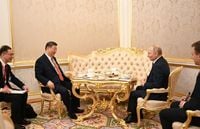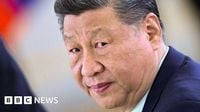On May 9, 2025, Chinese President Xi Jinping attended celebrations in Moscow marking the 80th anniversary of the victory in the Soviet Union's Great Patriotic War. This significant event brought together leaders from over 20 countries and international organizations, showcasing the importance of the occasion. Xi participated in a solemn moment, laying flowers at the Tomb of the Unknown Soldier and observing a moment of silence, honoring those who fought valiantly during the war.
During the celebrations, Xi was seen standing prominently beside Russian President Vladimir Putin, a visual representation of the strong ties between the two nations. Xi described the bond between Russia and China as "unbreakable," emphasizing their relationship as one of steadfast allies. This visit marks Xi's 11th trip to Russia since he became president in 2013, with the two leaders having met on more than 40 occasions.
Putin has announced plans to visit China in the autumn of 2025, indicating a continued commitment to strengthening bilateral relations. The leaders engaged in extensive discussions about the multifaceted aspects of China-Russia relations and key international and regional issues. According to a Foreign Ministry spokesperson, they achieved numerous fresh and substantial mutual agreements during their deliberations.
During the visit, Xi and Putin formally signed the Joint Statement Between the People's Republic of China and the Russian Federation, aimed at further enhancing the China-Russia Comprehensive Strategic Partnership of Coordination for the New Era. This momentous occasion coincided with the 80th anniversary of the victory of the Chinese People's War of Resistance Against Japanese Aggression, the Soviet Union's Great Patriotic War, and the founding of the United Nations.
The leaders exchanged over 20 bilateral cooperation documents, injecting renewed vigor into their relationship. President Xi underscored the historical significance, inherent dynamism, and cultural richness that define the partnership between China and Russia. He emphasized that their alliance is not aimed at any third party and remains unencumbered by external constraints.
In his address, Xi outlined a vision of enduring goodwill, strategic coordination, and mutually beneficial collaboration at the heart of their strategic partnership. He stressed the importance of nurturing enduring friendship, deepening political trust, enhancing strategic coordination, pursuing mutual benefit, and expanding practical cooperation across various sectors.
Amid rising unilateralism and power-centric politics on the global stage, China and Russia, as major powers and permanent members of the UN Security Council, stand united to preserve the historical legacy of World War II, safeguard the integrity of the UN, and uphold the post-war global order. They aim to champion a multipolar world marked by equitable and inclusive economic globalization.
The joint statement on global strategic stability issued during the visit underscores the commitment of China and Russia to authentic multilateralism, supporting the central role of the UN and relevant international mechanisms. The leaders affirmed their stance against Cold War mentalities and zero-sum games, advocating for dialogue, mutual respect, and confidence-building to avert potential misjudgments in international affairs.
Furthermore, a joint declaration emphasizing cooperation to uphold the authority of international law underscored the unwavering commitment of both nations to foundational principles such as the UN Charter and the Five Principles of Peaceful Coexistence. The declaration firmly rejected unilateral sanctions and extraterritorial jurisdiction, showcasing a united front in defending the international legal order.
However, the relationship between Xi and Putin is complex. While they project an image of unity, analysts caution that there are underlying tensions. Mathieu Boulegue from the Center for European Policy Analysis noted, "We see a lot of exchanges between the two men and patriotic displays of togetherness. They can be friends on one end or cooperating on one end and then ripping each other apart on others, and actually be competitors in certain aspects of their relationship." This highlights the performance aspect of their relationship, where symbolism often overshadows the reality of their interactions.
As Xi seeks to balance his relationship with Russia and the need for broader international partnerships, he is aware of the potential risks involved. With Putin's invasion of Ukraine making him an international pariah, Beijing must tread carefully to avoid isolating itself from other prospective partners. China has been courting Europe for several months, presenting itself as a stable alternative to the unpredictable nature of U.S. politics.
Earlier this week, Ursula von der Leyen, the president of the European Commission, and António Costa, the president of the European Council, exchanged messages with President Xi and Chinese Premier Li Qiang to celebrate the 50th anniversary of bilateral relations. However, the close-knit relationship between Beijing and Moscow remains a significant hurdle in any prospective partnership with Europe.
Xi's recent statements reflect a desire to project strength and unity. In a signed article for Russian media, he wrote, "Together, we must foil all schemes to disrupt or undermine our bonds of amity and trust." This message, coupled with their shared criticism of U.S. defense initiatives, indicates a concerted effort to present a united front against perceived external threats.
In conclusion, Xi's participation in the Victory Day celebrations in Moscow was more than just a commemorative event; it served as a platform for reinforcing the strategic partnership between China and Russia. As both leaders navigate the complexities of their relationship, the world watches closely, aware that the dynamics of this alliance will have far-reaching implications for global politics.





